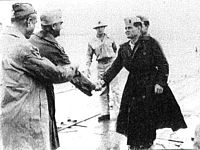Portal:Hispanic and Latino Americans
Welcome to the Hispanic and Latino Americans portalHispanic and Latino Americans (Spanish: Estadounidenses hispanos y latinos; Portuguese: Americanos Hispânicos e latinos) are Americans (in U.S.A.) of full or partial Spanish and/or Latin American background, culture, or family origin. These demographics include all Americans who identify as Hispanic or Latino regardless of race. As of 2020, the Census Bureau estimated that there were almost 65.3 million Hispanics and Latinos living in the United States and its territories. "Origin" can be viewed as the ancestry, nationality group, lineage or country of birth of the person or the person's parents or ancestors before their arrival in the United States of America. People who identify as Hispanic or Latino may be of any race, because similarly to what occurred during the colonization and post-independence of the United States, Latin American countries had their populations made up of multiracial and monoracial descendants of white European colonizers, indigenous peoples of the Americas, descendants of black African slaves, and post-independence immigrants from Europe, the Middle East, and East Asia. As one of only two specifically designated categories of ethnicity in the United States, Hispanics and Latinos form a pan-ethnicity incorporating a diversity of inter-related cultural and linguistic heritages, the use of the Spanish and Portuguese languages being the most important of all. The largest national origin groups of Hispanic and Latino Americans in order of population size are: Mexican, Puerto Rican, Cuban, Salvadoran, Dominican, Brazilian, Colombian, Guatemalan, Honduran, Ecuadorian, Peruvian, Venezuelan and Nicaraguan. The predominant origin of regional Hispanic and Latino populations varies widely in different locations across the country. In 2012, Hispanic Americans were the second fastest-growing ethnic group by percentage growth in the United States after Asian Americans. (Full article...) Selected article On December 7, 1941, when the United States officially entered the war, Hispanic Americans were among the many American citizens who joined the ranks of the Army, Navy and Marine Corps as volunteers or through the draft. Not only did Hispanics serve as active combatants in the European and Pacific Theatres of war, but they also served on the home front as civilians. Hundreds of Hispanic women joined the Women's Army Auxiliary Corps (WAACs) and Women Accepted for Volunteer Emergency Service (WAVES), serving as nurses and in administrative positions. Many worked in traditionally male labor jobs in the manufacturing plants that produced munitions and materiel, replacing men who were away at war. (more...) Selected image Photo of John Gavin as Harrison Destry from the short-lived television series Destry (1964) image credit: publicity photograph
Did you know...
2008 Things you can do
Selected biography SubcategoriesRelated PortalsAssociated WikiProjects
Hispanic and Latino American TopicsAfro-Latin American | Asian Hispanic and Latino Americans | Black Hispanic and Latino Americans | Californio | Chicano | Cuban American | Demographics of Hispanic and Latino Americans | Hispanic | Hispanic Americans in World War II | Hispanic and Latino Americans | Hispanic–Latino naming dispute | Hispanos | Latino | List of Hispanic and Latino Americans | MEChA | Mexican American | Puerto Rican people | Spanish language in the United States | Tejano | White Hispanic and Latino Americans Associated WikimediaThe following Wikimedia Foundation sister projects provide more on this subject:
Discover Wikipedia using portals
|






















